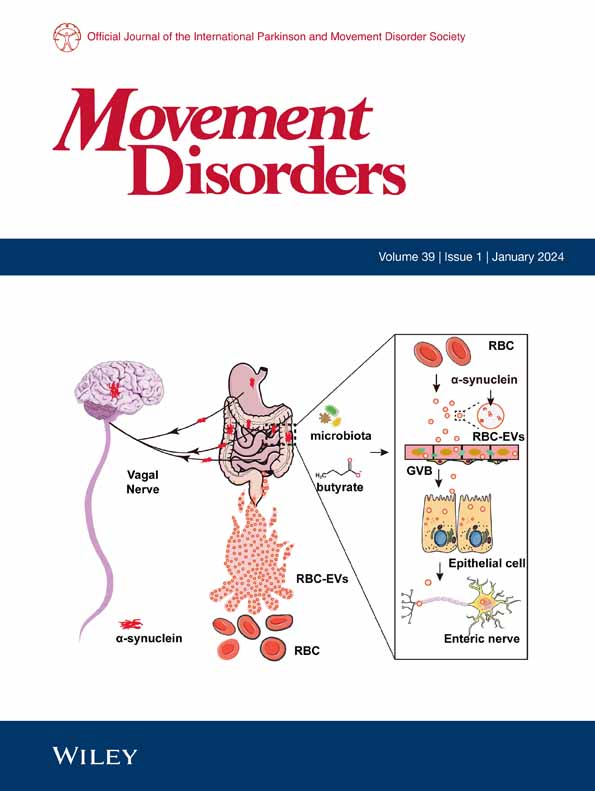Clinical correlates of quality of life in Tourette syndrome†
Clare M. Eddy BSc, PhD, Andrea E. Cavanna MD, PhD, Mariangela Gulisano MD, PhD, Antonella Agodi PhD, Martina Barchitta PhD, Paola Calì MD, Mary M. Robertson MBChB, MD, DSc (Med), DPM, FRCPCH, FRCP (UK), FRCPsych, Renata Rizzo MD, PhD
下载PDF
{"title":"Clinical correlates of quality of life in Tourette syndrome†","authors":"Clare M. Eddy BSc, PhD, Andrea E. Cavanna MD, PhD, Mariangela Gulisano MD, PhD, Antonella Agodi PhD, Martina Barchitta PhD, Paola Calì MD, Mary M. Robertson MBChB, MD, DSc (Med), DPM, FRCPCH, FRCP (UK), FRCPsych, Renata Rizzo MD, PhD","doi":"10.1002/mds.23434","DOIUrl":null,"url":null,"abstract":"<p>Tourette syndrome (TS) is a neurodevelopmental disorder involving tics, which is frequently accompanied by comorbid obsessive compulsive (OCD) or attention deficit hyperactivity disorder (ADHD). Individuals with TS often report poor quality of life (QoL) in comparison with the general population. This study investigated the clinical correlates of QoL in young people with TS using a self-report multidimensional QoL measure, and a range of clinical scales used to assess tic severity and the symptoms of anxiety, depression, OCD, ADHD and other emotional and behavioral symptoms. Symptoms of depression, OCD, and ADHD appeared to have a widespread negative impact on QoL, but poorer QoL was not associated with increased tic severity. Greater emotional and behavioral difficulties, including symptoms of OCD, were among the best predictors of poor QoL in young people with TS. © 2010 Movement Disorder Society</p>","PeriodicalId":213,"journal":{"name":"Movement Disorders","volume":"26 4","pages":"735-738"},"PeriodicalIF":7.6000,"publicationDate":"2010-11-10","publicationTypes":"Journal Article","fieldsOfStudy":null,"isOpenAccess":false,"openAccessPdf":"https://sci-hub-pdf.com/10.1002/mds.23434","citationCount":"112","resultStr":null,"platform":"Semanticscholar","paperid":null,"PeriodicalName":"Movement Disorders","FirstCategoryId":"3","ListUrlMain":"https://onlinelibrary.wiley.com/doi/10.1002/mds.23434","RegionNum":1,"RegionCategory":"医学","ArticlePicture":[],"TitleCN":null,"AbstractTextCN":null,"PMCID":null,"EPubDate":"","PubModel":"","JCR":"Q1","JCRName":"CLINICAL NEUROLOGY","Score":null,"Total":0}
引用次数: 112
引用
批量引用
Abstract
Tourette syndrome (TS) is a neurodevelopmental disorder involving tics, which is frequently accompanied by comorbid obsessive compulsive (OCD) or attention deficit hyperactivity disorder (ADHD). Individuals with TS often report poor quality of life (QoL) in comparison with the general population. This study investigated the clinical correlates of QoL in young people with TS using a self-report multidimensional QoL measure, and a range of clinical scales used to assess tic severity and the symptoms of anxiety, depression, OCD, ADHD and other emotional and behavioral symptoms. Symptoms of depression, OCD, and ADHD appeared to have a widespread negative impact on QoL, but poorer QoL was not associated with increased tic severity. Greater emotional and behavioral difficulties, including symptoms of OCD, were among the best predictors of poor QoL in young people with TS. © 2010 Movement Disorder Society


